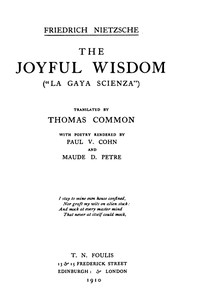The Joyful Wisdom ("La Gaya Scienza"): Complete Works, Volume Ten
Author: Friedrich Wilhelm Nietzsche
Bookshelves: Philosophy & Ethics, Psychiatry/Psychology, Religion/Spirituality/Paranormal

Summary
"The Joyful Wisdom" by Friedrich Wilhelm Nietzsche is a philosophical treatise written in the late 19th century. The work explores themes of life, laughter, morality, and the human condition, attempting to reconcile the often painful realities of existence with a joyful acceptance of life itself. Nietzsche's distinctive voice and provocative ideas challenge conventional beliefs, positioning him as a significant figure in existential thought. The opening of "The Joyful Wisdom" establishes the groundwork for Nietzsche's exploration of happiness and human experience. He introduces the concept of "joyful wisdom" as a playful yet profound response to life's trials, reflecting on ideas of health and convalescence, and suggesting that genuine wisdom can emerge from suffering. Nietzsche emphasizes the importance of questioning existing moral frameworks while advocating for a new understanding of life that embraces both its joyous and tragic elements. He suggests that humor and lightness are essential tools in navigating existence, setting the stage for a critical examination of conventional beliefs about morality, suffering, and happiness throughout the text. (This is an automatically generated summary.)
 LibraryManager
LibraryManager